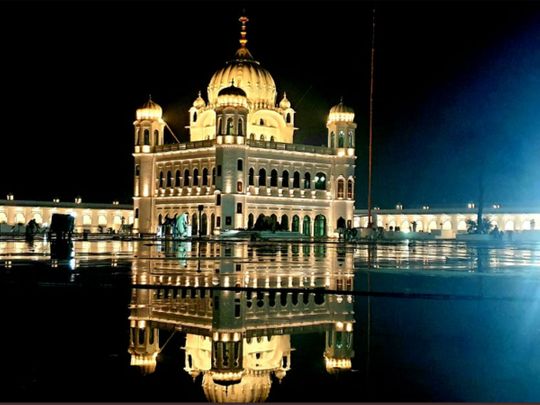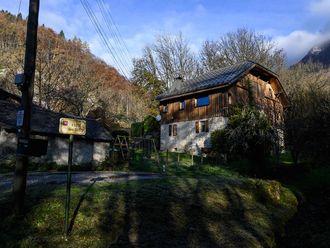
Highlights
- On November 9, Pakistan opened the Kartarpur Corridor. The day became another landmark in Pakistan’s rediscovered enlightenment and acceptance with generosity of spirit a fundamental tenet of humanity: inclusiveness.
- With the arrival of Sikh pilgrims from India, including former Indian prime minister, Manmohan Singh, the few-mile Kartarpur Corridor became the pathway to one of Sikhs’ holiest places.
As hope lays frail, darkness recedes when slivers of sunlight, splendid, proud, reach an arctic cave. The world moving towards its moral centre is a barefoot walk on a frozen expanse. It is still joyous.
Asia bibi, a poor Christian woman from the village Ittanwala in Punjab, arrested in 2009 on an allegation of blasphemy, was sentenced to death in 2010. Her life was a series of solitary confinements, her punishment based on an unproven, false accusation a challenge for a few human rights activists and conscientious lawyers, her release a taboo in a Pakistan where even mentioning her case placed a bullseye on your faith. Salmaan Taseer’s midday assassination in a public place was the deadly silencing of any future courageous voice rising against the blackness of the British-made blasphemy law, practised in Pakistan, that destroyed lives in the name of Allah and His prophet who require no human protection.
Many appeals failed. Several years passed. Asia bibi remained jailed, forgotten, hidden in the dark.
On October 31, 2018, two months after swearing-in of Imran Khan as the new prime minister of Pakistan, the Supreme Court, in a historic move, overturned Asia bibi’s conviction and death sentence. A nationwide protest, headed by self-appointed vigilantes of religion, swelled on the outrage of a ‘blasphemer having been pardoned’. Instead of jubilation that even the highest human court had found Asia bibi not guilty of any kind of blasphemy, hordes of men, duped on the sanctification of their intention, threatened harm if the decision remained unrevoked.
Prime Minister Khan, reiterating his absolute faith in Allah and His prophet, supported the Supreme Court verdict, and issued an ultimatum to those who threatened to unleash havoc in Pakistan misusing religious injunctions. He told them not to “clash with the state.”
Protests ended without any damage to life and property. The Supreme Court verdict and Khan’s stance brought a hint of solace amidst the lingering dismay and disappointment of Khan government’s September 7 rescinding of its appointment of the world-renowned Princeton economist, Atif Rehman Mian, as an advisor to Khan-led Economic Advisory Council. Atif Mian, despite his impeccable educational and professional credentials, was removed, albeit much reluctantly, because a large section of Pakistan, ostensibly, had a fundamental issue with his faith. Atif Mian is an Ahmedi Muslim. Human beings have forcibly patented as their religious right what is only a divine prerogative: judging an individual’s faith.
Kartarpur Corridor
On November 26, 2018, Prime Minister Khan, along with Chief of Army Staff Qamar Javed Bajwa, inaugurated the Kartarpur Corridor or Rahdari in the Narowal district of Punjab. The corridor linking Pakistan’s Kartarpur to India’s Gurdaspur opened the way for Sikh pilgrims to visit one of their holiest places, the shrine of Guru Nanak Dev Saheb. Celebrated as the residence where Guru Nanak is said to have spent the last eighteen years of his life, the Gurdwara Darbar Saheb in Kartarpur is as sacred to Sikhs as Mecca is to Muslims. Khan promised to open the corridor for the 550th birth anniversary of Guru Nanak Dev Saheb in November 2019.
The January of 2019 ended with the Supreme Court upholding its verdict of Asia Bibi’s release. Outrage whimpered in the background.
One road opens the way for another. In March 2019, the government of Pakistan stated its willingness to open the Sharda Temple Corridor in Pakistan Administered Jammu and Kashmir for Hindu pilgrims from Kashmir across the border and India.
In April 2019, the government announced restoration and reopening of Hindu temples that had been closed for prayer for decades. The restoration work, according to the Evacuee Trust Property Board, was to start with two historic Hindu temples in Sialkot and Peshawar.
In May 2019, Asia Bibi, despite strident noise about her release, was sent to Canada to join her family.
Speaking to a delegation of Thai Buddhist monks in October 2019, Pakistan Foreign Secretary Sohail Mahmood said: “Pakistan is proud of its multicultural heritage, which has been assiduously preserved and promoted as the shared heritage of mankind.” Thai Monk Most Venerable Arayawangso, reiterating Pakistan’s mission to realign its ethos vis-à-vis recognising and respecting sensibilities of followers of other faiths, stated: “This sends a message to the world that peace existed on the land of Pakistan...This will be a gateway to peace and harmony.”
Buddhist monks from South Korea visited the Bhamala Stupa in Haripur, Pakistan, earlier this month. Buddhist chief monks Dr Neung-her Sinim, Jeok Kyung and Jeong Wei prayed for peace in the region at their scared stupa. Speaking to Gulf News, Dr Neung said: “Pakistanis and the world must realise the significance Bhamala holds for the spiritual community. Our ancestors chose this place. This is why we pray here for peace in the region and the world.”
Earlier this week, PTI Central Secretary Information Ahmad Jawad announced the reopening of four hundred Hindu temples in Pakistan. He said: “This development is being made in line with the longstanding demand of the Hindu community that their places of worship be restored to them.”
On November 9, India’s Supreme Court announced the Ayodhya verdict. The verdict reopened, in all its bleeding horror, the memories of the enormity of the demolition of the centuries old Babri Masjid and its aftermath.
Landmark day
On November 9, Pakistan opened the Kartarpur Corridor. The day became another landmark in Pakistan’s rediscovered enlightenment and acceptance with generosity of spirit a fundamental tenet of humanity: inclusiveness. With the arrival of Sikh pilgrims from India, including former Indian prime minister, Manmohan Singh, the few-mile Kartarpur Corridor became the pathway to one of Sikhs’ holiest places. Today, the Guru Nanak Gurdwara is the magnificent symbol, resplendent in its white simplicity, of deep significance of religion working as a collective embrace of humanity, and not a divisive political tool.
A year ago, Prime Minister Khan made a promise to his Sikh friend and guest, Navjot Singh Sidhu, and all visiting Sikhs that Pakistan would open the Kartarpur Corridor for the 550th birth anniversary of Guru Nanak. Pakistan kept its promise.
Read more from Mehr Tarar
- Kasur rapes and killings: Will Pakistan ever be safe for its children? When will I get an answer?
- Pakistani filmmaker Jamshed Mehmood recounts the day he was raped and the aftermath
- #MeToo: In Afzal Mehmood’s death, not much will change in Pakistan
- Sexual abuse: In Pakistan, like the rest of the world, not many listen, not many care
Khan, speaking on the occasion of the opening of the Kartarpur Rahdari said: “First of all, I congratulate the Sikh community on the 550th birth anniversary of Baba Guru Nanak and welcome you all... I am always so happy to see the Sikh community that has come here. God lives in the hearts of all of us. All the messengers who have come and gone only ever brought two messages, that of peace and justice.”
Khan said: “I am happy we could do this for you. Believe me, I had no idea of the importance this place holds; I found out a year ago.” That Khan is the leader of a Pakistan that is inclusive, diverse, generous, compassionate. That is the Pakistan of Mohammad Ali Jinnah’s vision, and the hope of millions of Pakistanis. That is my Pakistan.
And that is the Pakistan of all those Pakistanis who think of their neighbours like the bus driver Saddam Hussain does. His unrehearsed, glorious words to an Indian journalist on November 9, while driving a shuttle bus from the Kartarpur terminal to the Gurdwara, echo the collective sentiments of a Pakistan that believes in the power of religions, even in their differences, acting as a unifier.
Hussain said: “My happiness is such it might be more than yours. My eyes have welled up with tears that you have come to your home, to your Guru’s home. Allah knows. We have that feeling when we go for Haj. The way you have come, I swear I don’t know how to describe it. I don’t have words; I feel so much joy. Punjab has united again. May Allah keep you happy like you are now, and you keep visiting like you are now. Our arms are always open for you whenever you visit, sir.”









